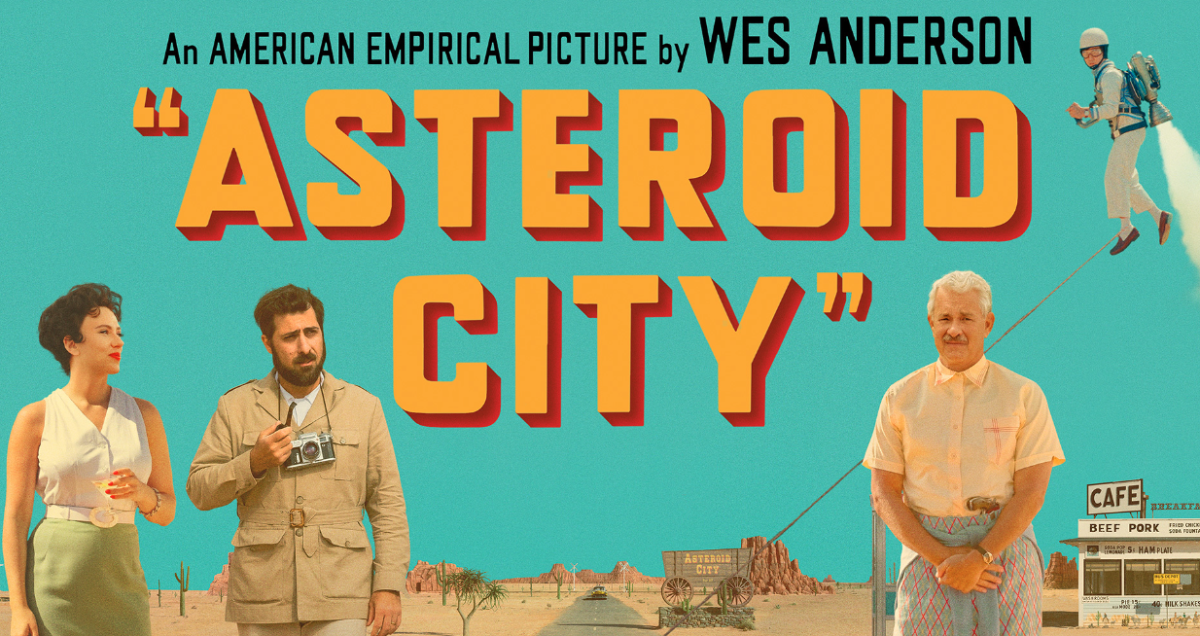Asteroid City showcases all the traditional features of a Wes Anderson movie – a highly-saturated color palette, deadpan delivery of dialogue, strange children, and Jason Schwartzman (who’s worked with Anderson numerous times since 1998’s Rushmore). Despite the visually familiar feel of his work, Anderson makes Asteroid City incredibly compelling — from its quiet depiction of grief, to its meaningless optimism and craving for exploration. It also features an incredible cast, with the likes of Scarlett Johannson, Maya Hawke, Tom Hanks, and Edward Norton.

Asteroid City sets up a somewhat difficult plot to follow in its “nesting-doll” structure—a play within a documentary—an incredibly ambitious way to tell a story in under two hours. The main character of the play, Augie Steenback (Schartzman), is a war photographer dealing with the loss of his wife and struggling to inform his three young daughters and his genius teenage son Woodrow, while on their visit to Asteroid City. The small town is named after its featured crater and is the location of an award ceremony for scientifically-gifted youths, including Woodrow himself. Their stay is interrupted by the surprising arrival of an alien, forcing all to quarantine in the town. The scenes of the play are interspersed with broadcasted behind-the-scenes footage of its creation by playwright Connor Earp (Norton).
In both the play itself, as well as behind the scenes, the performances of the actors and their blunt dialogues seem quite impersonal and unremarkable. Within these emotionally bland scenes, however, Anderson includes moments of both deadpan humor and poignant emotion. For example, when Augie finally reveals the truth of his wife’s death to his children, it is incredibly awkward, with an underlying sadness that he refuses to acknowledge: he emotionlessly pulls out a Tupperware container holding her ashes and comforts his kids with a brief hug and the excuse that he was never sure how to tell them. He humorlessly notes the moment when he’d lost a parent as a young child: “Time heals all wounds. No. Maybe it can be a Band-aid.”

A striking juxtaposition is created as the characters of the play deliver intimate and deeply emotional lines with absolute indifference, and often across a physical barrier. Actress Midge Campbell (Johansson), casually tells Augie: “I’m not a good mother. I love my daughter but I’m not a good mother because, unfortunately… she’s not my first priority,” while speaking through the windows of a motel. Barely a moment is wasted on their reactions, even as they are forced into close proximity to each other, physically and emotionally. Augie approaches these situations with the same detachment, snapping pictures of Midge and the alien with equal callousness and dispassionate acceptance. Meanwhile, Woodrow grapples with his loss while questioning the alien’s visit, anxious to grasp the significance of his own existence. The struggle to understand life, extraterrestrial or not, feels as impossible and meaningless then as the struggle of understanding and overcoming grief.
Asteroid City is undoubtedly a very Wes Anderson film; like many of his projects, it might require those with an acquired taste for his films to truly appreciate the quirky meta-ness of it all. Recently, TikTok users attempted to capture the visually striking quality of Anderson’s storytelling, with an emphasis on symmetrical shots, saturated colors, and stilted dialogue. However, Asteroid City, a thought-provoking film wrapped in storytelling of various forms, proves that his unique camerawork, staging, and color palettes are not merely beautiful attributes of otherwise superficial or meaningless filmmaking. If imitation is the sincerest form of flattery, no one is doing it quite like Wes Anderson.


